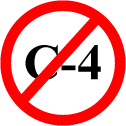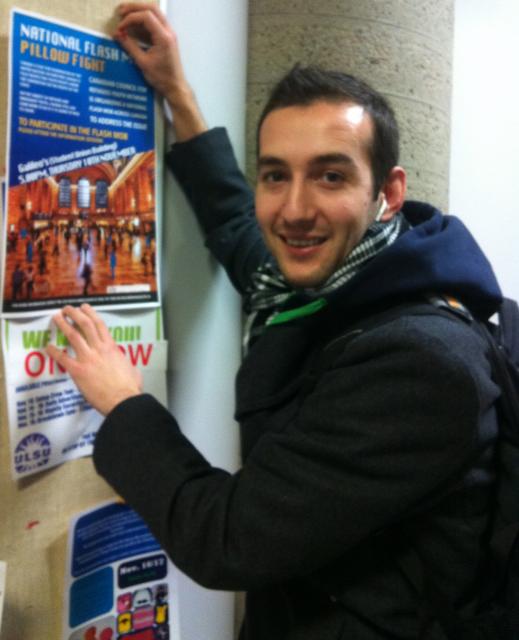CONTENTS:
Current issue and campaign pages: |
Save the dates! Upcoming CCR meetings in 2012:Winter working group meetings, Friday, February 24 - Saturday, February 25, Toronto Spring Consultation, Thursday, May 31 - Saturday, June 2, Fredericton Fall Consultation, Thursday, November 29 - Saturday, December 1, Toronto |
a) Proposal for Conditional permanent residence would increase violence against women
b) Bill C-4, the anti-smuggling, anti-refugee bill – still at second reading in the House
c) Proposed Change to Citizenship Requirements: Proof of language proficiency
d) National Flashmobs for Children and Youth Rights: Reports from the streets
e) CCR Fall Consultation successfully held in Montreal
f) Faces of the CCR: Dugi Berisha, Lethbridge
g) Resources from the CCR
- CCR Annual Report 2010-2011
- CCR Resolutions database now online
---
a) Proposal for Conditional permanent residence would increase violence against women
 The CCR together with other organizations has expressed concern over the federal government’s plan to introduce “conditional permanent residence” for some sponsored spouses. According to the proposal, if a sponsored spouse leaves a relationship within two years of arrival in Canada, he or she could be stripped of status in Canada and deported.
The CCR together with other organizations has expressed concern over the federal government’s plan to introduce “conditional permanent residence” for some sponsored spouses. According to the proposal, if a sponsored spouse leaves a relationship within two years of arrival in Canada, he or she could be stripped of status in Canada and deported.
The proposal would increase the risk of spousal abuse, especially among newcomer women. People from certain countries of origin may also be targeted and the measure may be applied in a discriminatory manner.
Women’s organizations have denounced the impact of similar measures already in place in Australia, the UK and the United States. Women who have precarious status often feel forced to remain in an abusive relationship for fear of being deported, and in some cases separated from their children.Minister of Citizenship and Immigration Jason Kenney has recently stated that he intends to introduce the measure before the year’s end.
Fifty organizations across Canada have signed on to a statement of opposition to the proposal: ccrweb.ca/en/statement-proposed-conditional-permanent-residence-sponsored-spouses
For the complete news release, see ccrweb.ca/en/bulletin/11/11/10
For more information on the proposal for conditional permanent residence and to take action against it, see: ccrweb.ca/en/conditional-permanent-residence
b) Bill C-4, the anti-smuggling, anti-refugee bill – still at second reading in the House
 Bill C-4 has not been further debated in the House, but continues to be the focus of criticism and challenge because of the way it punishes refugees. Groups are expressing their opposition through petitions, public statements, visits to Members of Parliament, even flashmobs. 90 organizations have signed the CCR statement of opposition to C-4.
Bill C-4 has not been further debated in the House, but continues to be the focus of criticism and challenge because of the way it punishes refugees. Groups are expressing their opposition through petitions, public statements, visits to Members of Parliament, even flashmobs. 90 organizations have signed the CCR statement of opposition to C-4.
The CCR recently published a detailed brief on Bill C-4: ccrweb.ca/files/c-4-brief.pdf
Bill C-4 would jail children – a recent CCR Youth Network short video highlights what it means to put children behind bars: www.youtube.com/ccrwebvideos#p/c/525C65505F27330C
c) Proposed Change to Citizenship Requirements: Proof of language proficiency
The CCR has responded with concern to the government’s proposal to require applicants for Canadian citizenship to provide upfront evidence of language ability. Applicants would have to submit, with their citizenship application, proof that they have achieved at least Canadian Language Benchmark level 4 in speaking and listening.
Newcomers themselves know how important learning Canada’s official languages is for successful integration.
However, the CCR is concerned about the impact of the proposed change on certain vulnerable groups of newcomers, in particular because of:
- The difficulties experienced by some newcomers in learning a new language; and
- The additional burden for some newcomers in having to provide proof of language proficiency.
Some newcomers face more challenges than others in learning a new language – this includes refugees who have experienced trauma or spent years in a situation of deprivation, women who are full-time caregivers and people with intellectual challenges or learning disabilities.
Under the proposal, even if they do speak English or French, many applicants will have to pay extra costs for language testing. This includes many refugees and other vulnerable persons who can ill afford extra expenses.
Rather than attaining its stated objective of strengthening the integration of newcomers in Canada by improving language outcomes and encouraging their full participation in Canadian society, this proposal will create barriers to citizenship and thus deny certain rights and protections for particular groups.
To read the CCR’s detailed comments on these proposed changes, see: ccrweb.ca/en/proposed-change-citizenship-proof-language-proficiency
d) National Flashmobs for Children and Youth Rights: Reports from the streets
 This November, the CCR Youth Network organized flashmobs across Canada to raise awareness about the different ways in which Canada could do better to respect the rights of non-citizen children and youth. The time to act is now: the United Nations is getting ready to examine Canada on its respect of children’s rights.
This November, the CCR Youth Network organized flashmobs across Canada to raise awareness about the different ways in which Canada could do better to respect the rights of non-citizen children and youth. The time to act is now: the United Nations is getting ready to examine Canada on its respect of children’s rights.
So far, organizations that have supported local flashmobs include: Lethbridge Family Services, CCR Youth Edmonton with support from Catholic Social Services Edmonton, Parkdale Community Information Centre Youth Program, B.Refuge, Multicultural Association of Fredericton Inc., and Refugee and Immigrant Advisory Council.
Some of the flashmob videos are available online at: youtube.com/playlist?list=PL00EE7E6E5AEA59E9
Your organization is not on the list? It’s not too late to get involved! For example, groups in Winnipeg (IRCOM) and Kitchener (MCRS) are still planning flashmobs! But if flashmobs aren’t your thing, there are other ways to join the movement. Groups who have already finished their flashmobs will be meeting with their MPs this winter to give them petition signatures and demand changes. Join them! For contact information of local organizers, see: ccrweb.ca/en/youthrights/flash-mob
For related media stories, see: ccrweb.ca/en/taxonomy/term/944
e) CCR Fall Consultation successfully held in Montreal
 More than 370 people participated in the CCR Fall Consultation in Montreal from 24 to 26 November 2011. We would like to thank everyone, especially local organizing committee members and volunteers, who contributed to its success!
More than 370 people participated in the CCR Fall Consultation in Montreal from 24 to 26 November 2011. We would like to thank everyone, especially local organizing committee members and volunteers, who contributed to its success!
The summary report of the consultation will soon be available online under Recent Information at: ccrweb.ca/en/recent and ccrweb.ca/meetings
For CCR members, PowerPoint presentations and handouts from many of the workshops are available on the CCR website, at: ccrweb.ca/en/consultnov2011-presentations. We are adding presentations as they come in, so you might want to check in again later.
Are you with a CCR member organization and you don’t yet have an account? Set one up following the instructions at: ccrweb.ca/en/user/register
Don’t know if your organization in a CCR member? For an up-to-date list of CCR members, see the ‘Links’ page on the CCR website at: ccrweb.ca/en/links
The resolutions adopted by the CCR membership in November 2011 are available at: ccrweb.ca/en/resolutions-nov2011
The CCR would like to thank the outgoing members of the CCR Executive Committee for their valuable work: Elizabeth McWeeny (Past President), Monica Abdelkader and Deborah Isaacs (Counsellors).
We extend a warm welcome to Huda Bukhari and Jean McRae who join the CCR Executive as Counsellors. Wanda Yamamoto and Loly Rico have been re-elected President and Vice-President, and Rivka Augenfeld, Georges Bahaya, Heather Neufeld, and Eunice Valenzuela rejoin the Executive Committee as Counsellors. We look forward to working with you all!
The Overseas Protection and Sponsorship Working Group would like to thank outgoing chair Jennifer Mpungu for her efforts and welcomes Elizabeth McWeeny, who will co-chair the Working Group with Rose Dekker.
Francisco Rico-Martinez was elected Co-Chair of the Inland Protection Working Group and will lead the Working Group with Chantal Tie, replacing Debbie Hill-Corrigan, who served for two terms.
The Immigration and Settlement Working Group is seeking candidates for co-chair, to replace Debbie Douglas who has provided strong leadership, over many years. Sherman Chan is the other co-chair of the working group. Know of a candidate for the co-chair position? Contact Marisa Berry-Méndez at mberrymendez@ccrweb.ca for more information.
For a ‘Who’s who?’ of CCR Executive members and Working Group co-chairs, see: ccrweb.ca/en/executive-committee-and-working-group-chairs
f) Faces of the CCR: Dugi Berisha, Lethbridge
 Dugi Berisha is finishing his studies at the University of Lethbridge, majoring in Management and Social Responsibility. After volunteering with the Lethbridge Family Services -Immigrant Services (LFS) this past summer at a camp for immigrant and refugee youth, he became a CCR Youth Ambassador.
Dugi Berisha is finishing his studies at the University of Lethbridge, majoring in Management and Social Responsibility. After volunteering with the Lethbridge Family Services -Immigrant Services (LFS) this past summer at a camp for immigrant and refugee youth, he became a CCR Youth Ambassador.
To Dugi, one of the biggest challenges for immigrant youth is adjusting to Canadian society. It determines how young immigrants will do in the future and how much they will be able to give back. Inclusion programs are essential to help newcomer youth have an easier and faster adjustment process in their new home. For example, LFS in Lethbridge offers such programs, but Dugi feels that similar, adequately-funded programs are needed elsewhere.
Processing times for family reunification are also a major concern for Dugi. He was separated from his parents when he was 12 during the ethnic conflict in Kosovo in 1999. “This experience had a profound impact on shaping my worldviews. I know how important it is for immigrant and refugee youth to have people who support them and help address their issues on their behalf. This I believe makes them more welcomed and safe, knowing that there are people who care about their well-being.”
As a CCR Youth Ambassador, Dugi organized one of the many flashmobs across Canada for non-citizen children and youth rights. Despite temperatures that dipped to -15C, many people came to the Lethbridge event, including most of the major media in town. Now that the flashmob is finished, Dugi plans to meet with his Member of Parliament and present the petition signatures collected at the flashmob.
Together with LFS, Dugi plans to organize future events for newcomer youth in the city and to spread the word about the CCR Youth Network. “Getting involved with the Youth Network is a way to learn more about the problems that non-citizen youth face in Canada and to address and solve some of these problems.”
To find out more about the flashmob for non-citizen children and youth rights in Lethbridge, go to: http://bit.ly/rTItNf
To get involved with the CCR Youth Network and the campaign for non-citizen children and youth rights, see: ccrweb.ca/en/youthrights/frontpage
g) Resources from the CCR:
- CCR Annual Report 2010-2011
This booklet provides highlights of activities and events over the past year, as well as the CCR’s financial status. It is available online at: ccrweb.ca/en/annualreport2011
- CCR Resolutions database now online
CCR resolutions are now available in a searchable database at ccrweb.ca/en/resolutions. Search by word, date, topic, and more. Please let us know what you think about this new tool. Send us your feedback at: jdench@ccrweb.ca
-----
Looking for other ways to stay in touch with the CCR and refugee and immigration issues? Subscribe to receive updates from the CCR on Twitter and Facebook:
To join the CCR on Facebook: facebook.com/ccrweb
To follow the CCR on Twitter: twitter.com/ccrweb
To view CCR videos on YouTube: youtube.com/ccrwebvideos
